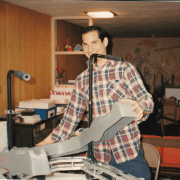Holidays, Family Time and those “Hard Conversations”
The holiday season is a time for great joy, family gatherings, and everlasting memories. For many of us, holiday time is when we finally have a few vacation days to spend time with our loved ones. This quality time together with family can also allows us to observe more clearly if they have significant mental and functional changes.
I have heard from so many patients and professionals that holidays, as family time, become our opportunity to also have some of these emotionally challenging conversations with our parents, grandparents, or other family members. Conditions deteriorate over time, and extended visits often make the need for increased care clearer to those of us who are looking in from the outside.
That doesn’t mean it is easy for our loved ones, however, to hear.
One of the hardest things I ever had to do in life, was to tell my Mother that she could not eat anymore. A respiratory therapist figured out that some of the food she was eating was going into her lungs and was the cause of her chronic breathing issues. When I learned about this problem, I told the therapist that I would speak to her. With a lump in my throat and a tear in my eye, I looked my mother in the eyes and I explained to her the situation. She listened carefully and trusted me and did not fight it; her will to live was very strong.
Through working with Neurologists, Physical Therapists and thousands of spouses, children and caregivers of U-Step Customers, I have some timely advice to keep in mind as you head home this holiday season and hope that you can have positive conversations with your loved ones despite the difficult circumstances.
Many people see a mobility aid (a cane or a walker) as a last resort, something that they don’t need until there is major trouble, it is accepting the fact that “it’s all downhill from here.” It is our job to gently help them understand that getting the right walker for their needs can be a fresh start – it will increase their independence and build their confidence in living an active lifestyle. Sadly, if a walking-aid is introduced too late with a person losing cognitive ability, they might not be able to learn to use this walking-aid when they absolutely need it to prevent falls. Broaching the subject of when to introduce a walker can be a delicate task, but I would like to offer some ideas to help make it easier:
The Earlier the Better
Start having these conversations earlier than you think you need to. Don’t wait until the situation becomes dire or even looming on the horizon to discuss the future. Talk about what signs you all feel comfortable with to know when it’s going to be time to incorporate a walker. This makes the conversation far less pressure-ridden as you are creating terms you are all happy with before there is a sign of trouble.
A Path to Independence
Help them understand that a walker is not a crutch to be seen negatively but a gateway to independence. They are not losing independence by using a walker – they are gaining it. They will be able to walk to the corner store, meet up at a local park with their friend for a stroll, and have the confidence to do so. Things they used to enjoy but are now avoiding can be a part of their life again.
Fall Prevention
The statistics on the danger of falls, the cascading problems after falls and how often people wait to get the help they need until after falls are staggering – even scary. While the numbers are compelling, in most situations, they are not the best way to talk about preventing falls with your loved ones. Nothing will make your loved one lose his or her independence as much as a fall will. Try instead of focus on how much independence one gains from the increased mobility of a walker (or cane.) In some cases, it is best to discuss how this lessens the burden on others in the family.
Sometimes a person of authority can be helpful in convincing loved-ones to use a walking-aid. I remember one neurologist telling me that when he thinks that a person is at risk of falling, he insists that they get a good walker to prevent them from hurting themselves. He said if you are not willing to listen to my advice, I cannot continue treating you.
Change Takes Time
None of us like to introduce change, and most of the significant changes we do may come only after weeks or months of thinking about it first. We should give that same time to consider change to our loved ones. Bringing up the issue with the goal of checking back about it in a few weeks gives someone time to digest the idea. You can also show them that you are serious and want to help by checking yourself if your loved one’s house is ready for a walker. Go through their house and see what literal stumbling blocks may be in your way. If you are able to, help them remove the obstacles to allow for an easy transition. You will show you are helping “pave the way” while also making it easier for them to say “yes.”
Sometimes trying out a walker is the easiest way to change someone’s mindset. One day I went to a person’s house to demonstrate a U-Step that was recommended by her neurologist. Her adult son stopped me before I got in the door and told me to ignore his mother’s comments. He said, “she isn’t going to like you because she does not want a walker.” Just as the son anticipated, she was very antagonistic and clearly took out her angst on me. After my demonstration, I left the sample for a two-week trial. About a week later, this very happy customer called me and thanked me up and down for bringing the U-Step walker.
Remember it’s a Two-Sided Conversation
Acknowledge their hesitancy. Never speak at your loved-one – tell them that you understand their feelings. It’s important to listen to everything they have to say regarding their feelings on getting a walker, their body’s abilities, and struggling with what they are going through. Make sure they know that they have been heard and make sure they know this is a two-way conversation. It helps to ask open-ended questions so they don’t feel like you’re pushing your agenda on them.
At the end of the day, no matter how much we express our concerns with our parent, spouse, or loved one – the decision to actually use a walker or cane is in their hands. I have seen so many families’ lives changed for the better with the introduction of the right device, gifting loved ones the ability to walk freely and safely.
May you have a wonderful holiday season with much time for family, love, laughter… and difficult or not, successful conversations.










Leave a Reply
Want to join the discussion?Feel free to contribute!